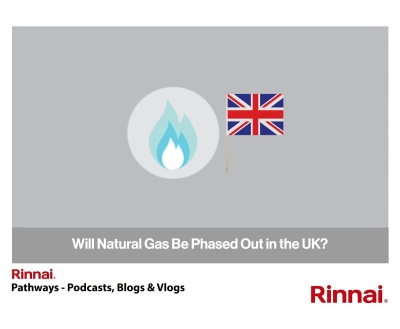Natural gas has long been the backbone of the UK’s energy system. It is used to heat over 85% of domiciles, powers industrial processes and plays a critical role in electricity generation.
As the UK heads toward net zero carbon emissions by 2050, the future of natural gas is under increasing scrutiny.
Leaving many asking: will it be phased out entirely?
The Role of Natural Gas Today
Natural gas currently accounts for a significant portion of the UK’s energy mix. In 2022, it made up roughly 35.2% of total energy consumption. It is used not only for domestic and commercial heating and hot water generation but also for generating electricity and powering industrial processes.
The gas is sourced from a combination of domestic production (primarily the North Sea) and imports from countries like Norway and Holland with a percentage also coming from Belgium.
The reliance on gas for the UK and members of the EU comes with environmental and geopolitical risks. Firstly burning natural gas emits carbon dioxide, which is attributable to contributing to climate change.
Secondly as we have seen from recent major conflicts the dependence on imported gas exposes the UK and the EU to market volatility and potential for supply disruptions.
Government Policy and Net Zero Commitments
The UK government has committed to achieving net zero emissions by 2050. This is a legally binding target which has acted as the catalyst for a raft of policy initiatives aimed at reducing fossil fuel use, including natural gas, oil and LPG.
One of the most notable steps is the ban on gas boilers in new homes from 2025, part of the Future Homes Standard and the ban of gas appliances for new build commercial buildings within the Future Building Standard.
Existing homes and buildings can continue using gas appliances, however the direction of travel is toward electrification. The current government wants to shift households and businesses toward low-carbon heating solutions like heat pumps and heat networks.
Is a Full Phase-Out Realistic?
The idea of completely phasing out natural gas is ambitious and complex. While the government aims to reduce gas boiler installations by 80% by 2035, full elimination of gas from the energy system has been described as a multi-generational initiative.
The Challenges
- Infrastructure - The UK’s gas grid is vast and deeply embedded in homes and businesses. Decommissioning it will require careful planning and significant investment.
- Affordability - Retrofitting homes and businesses with heat pumps or other low-carbon technologies can be expensive and challenging from practical and technical perspectives. Government grants like the Boiler Upgrade Scheme are designed to support this burden for domestic users.
- Public Acceptance - Many households and businesses are comfortable with gas and may resist change, especially if alternatives are perceived as less effective or more costly.
The Alternatives
- Heat Pumps - Air-source and ground-source heat pumps are central to the UK’s decarbonisation strategy. They use electricity to extract heat from the air or ground and are highly efficient. The government aims to install 600,000 heat pumps annually by 2028.
- Heat Networks - District heating systems distribute heat from a central source to multiple buildings. Though currently serving less than 3% of UK homes, the government wants this to grow to 20% by 2050, supported by schemes like the Green Heat Network Fund.
- Hydrogen - The UK’s hydrogen strategy envisions hydrogen meeting 20–35% of total energy demand by 2050. However, its role in domestic heating remains uncertain. The Climate Change Committee has advised against using hydrogen for home heating, citing cost and efficiency concerns.
Commercial and Industrial Implications
For businesses, especially in manufacturing and hospitality, the phase-out of natural gas presents both risks and opportunities. Industrial processes reliant on gas will need to transition to electrified systems or adopt CCS technologies.
Commercial buildings will face pressure to retrofit heating systems, potentially incurring significant capital costs.
The Decommissioning Challenge
As gas demand declines, the UK must plan for the decommissioning of its gas networks. A recent policy briefing from UCL highlights the need for a credible strategy to manage this transition, including funding mechanisms and public engagement.
What Does This Mean for Gas Users?
The phase-out of natural gas will be gradual. Existing gas boilers won’t be banned, and replacements will remain available for years. However, incentives and regulations will increasingly favour low-carbon options.
Considerations
Energy efficiency upgrades, insulation and smart controls strategies can reduce heating costs and prepare buildings for future technologies.
Exploring heat pump options with government grants available for domestic buildings, and increasing pressure for commercial landlords means now is a good time to study the practicalities of low carbon solutions.
Conclusion
Natural gas will not disappear from the UK overnight. Instead, we’re likely to see a managed decline, with gas playing a diminishing role in heating and electricity generation, offset by the rise of renewables, electrification, and possibly hydrogen.
The transition will require coordinated action from government, industry, and consumers. It will involve infrastructure upgrades, financial support, and public engagement. But if done right, it offers a pathway to a cleaner, more secure, and more resilient energy future.
